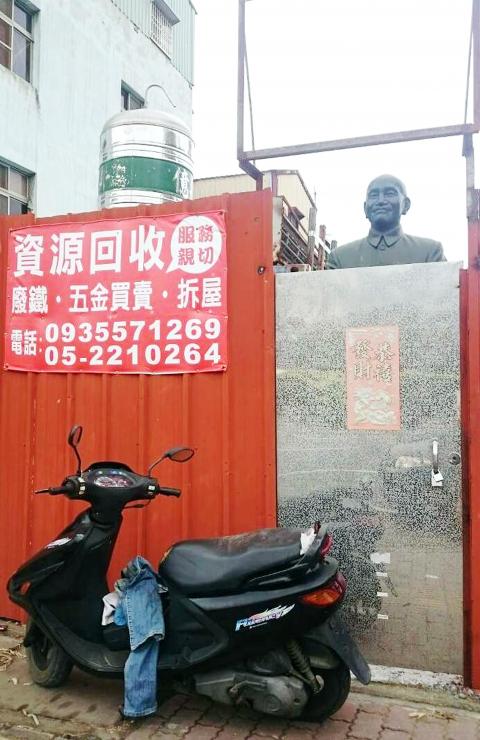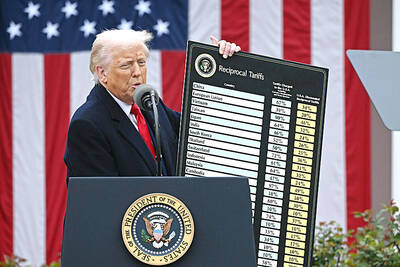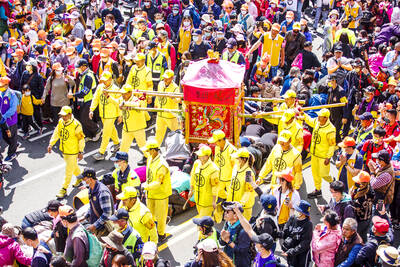On Jianguo Rd Sec 2 in Minsyong Township, Chiayi County there is a statue of late president Chiang Kai-shek, which was placed inside the main doorway of a recycling depot after having been reclaimed. Because the statue reaches over 3 meters tall, the head reaches above the top of the door in an eye-catching manner and so has playfully been named as the “door god.” An employee of the recycling depot surnamed Wang says some children don’t know who Chiang is and mistakenly thought it was a statue of Sun Yat-sen. It has turned into a signpost for the recycling depot, says Wang.
A year ago, the depot purchased wooden building materials from a demolition contractor which had demolished a disused village for military dependents in Yunlin County’s Huwei Township. It was then that Wang discovered the abandoned statue of Chiang made from fiberglass, although the paintwork was already peeling off badly. However, Wang decided there was a value to a commemorative statue of Chiang, since he was the first president of Taiwan. Wang therefore agreed with the contractor to purchase the whole lot together. After giving the statue a fresh coat of paint, it looked like new again.
Wang says she was worried the statue would be blown over during the recent typhoon that ravaged Taiwan, so used ropes to tie it down.

Photo: Yu Hsueh-lan, Taipei Times
照片:自由時報記者余雪蘭
The statue appears somewhat out of place, surrounded by piles of assorted recycled materials and seems a world apart from Chiang’s powerful image while in power. Wang says a passerby walked in to inquire whether they could purchase Chiang, offering NT$30,000, but she hopes to be able to sell the statue for an even higher price.
(Liberty Times, translated by Edward Jones)
嘉義縣民雄鄉建國路二段有一家資源回收場回收一尊蔣介石雕像後擺在大門內,因高達三公尺,高出門牆一顆頭,相當醒目,被戲稱是「門神」。回收場業者王姓婦人說,有些小朋友不認識蔣介石,誤以為是孫中山,現已成為回收場的地標。
王女說,一年多前從雲林縣虎尾一處已遷移的眷村向承包拆除工程的包商收購拆下來的建築木料時,發現被醒目的蔣介石像,材質為玻璃纖維,已嚴重落漆,但她覺得蔣氏是台灣第一位總統,其紀念像應有價值,經包商同意一併收購。重新上漆後看起來像新的一樣。
日前颱風來襲,王女怕蔣介石像被吹倒,還用繩子栓住,周邊堆置各種回收物,場景看起來很突兀,與過去蔣家執政的威風模樣有天壤之別。王女表示,有民眾路過看到雕像,進來詢問可否讓售,開價三萬多元,但她希望賣到更好的價格。
(自由時報記者余雪蘭)

US President Donald Trump is taking a blowtorch to the rules that have governed world trade for decades. The “reciprocal’’ tariffs that he announced Wednesday last week are likely to create chaos for global businesses and conflict with America’s allies and adversaries alike. Since the 1960s, tariffs — or import taxes — have emerged from negotiations between dozens of countries. Trump wants to seize the process. “Obviously, it disrupts the way that things have been done for a very long time,’’ said Richard Mojica, a trade attorney at Miller & Chevalier. “Trump is throwing that out the window ... Clearly this is

The Matsu pilgrimage is one of Taiwan’s most iconic annual religious events. This grand occasion is more than just a religious ceremony; it deeply reflects Taiwan’s history and culture. Originally, Matsu was the goddess of the sea, primarily responsible for protecting fishermen and ensuring their safe voyage. As immigrants brought Matsu worship to Taiwan, she gradually evolved into a deity overseeing health, business, and various aspects of life. In times of uncertainty, Matsu has become a vital source of spiritual comfort for the Taiwanese. The pilgrimage represents Matsu’s annual tour to inspect her domain, driving away evil and bringing

A: The World Expo 2025 is set to open in Osaka, Japan, on Sunday, with 158 countries and regions and nine international organizations participating in the event. B: Wow, what’s the theme this time? A: The theme is “Designing Future Society for Our Lives.” B: Do you want to go? How long will it last? A: It’ll run for 184 days, until Oct. 13. Maybe we can go to Osaka during summer vacation. A: 2025年世界博覽會預計週日將在日本大阪開幕,158個國家或地區及9大國際組織將參與盛會! B: 哇這次的主題是什麼? A: 主題是:「創造閃耀生命光輝的未來社會」。 B: 你想要去嗎?展出多久啊? A: 世博會共展出184天到10月13日,或許我們暑假時可以去大阪玩。 (By Eddy Chang, Taipei Times/台北時報張迪)

Monosodium glutamate (MSG) has been used in cooking for over a century to enhance flavor. It is often found in Chinese dishes and many other cuisines. Despite its common use, many people misunderstand the safety of MSG. The bad __1__ of MSG started in the late 1960s, when a letter to the New England Journal of Medicine described symptoms like a racing heart, weakness, and numbness after the writer ate Northern Chinese food. While no specific cause was __2__, a series of questionable studies in 1968 began to point the finger at MSG. In one such study, neurologist Herbert Schaumburg and